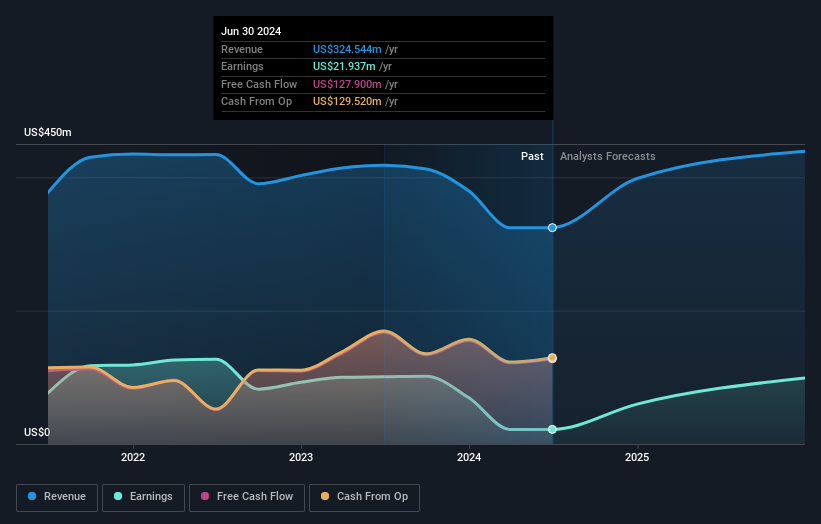- United States
- /
- Banks
- /
- NYSE:BHLB
Optimism for Berkshire Hills Bancorp (NYSE:BHLB) has grown this past week, despite one-year decline in earnings

There's no doubt that investing in the stock market is a truly brilliant way to build wealth. But if you choose that path, you're going to buy some stocks that fall short of the market. Unfortunately for shareholders, while the Berkshire Hills Bancorp, Inc. (NYSE:BHLB) share price is up 21% in the last year, that falls short of the market return. Having said that, the longer term returns aren't so impressive, with stock gaining just 3.1% in three years.
On the back of a solid 7-day performance, let's check what role the company's fundamentals have played in driving long term shareholder returns.
See our latest analysis for Berkshire Hills Bancorp
While markets are a powerful pricing mechanism, share prices reflect investor sentiment, not just underlying business performance. One flawed but reasonable way to assess how sentiment around a company has changed is to compare the earnings per share (EPS) with the share price.
Over the last twelve months, Berkshire Hills Bancorp actually shrank its EPS by 78%.
Given the share price gain, we doubt the market is measuring progress with EPS. Therefore, it seems likely that investors are putting more weight on metrics other than EPS, at the moment.
Unfortunately Berkshire Hills Bancorp's fell 22% over twelve months. So the fundamental metrics don't provide an obvious explanation for the share price gain.
You can see below how earnings and revenue have changed over time (discover the exact values by clicking on the image).

We consider it positive that insiders have made significant purchases in the last year. Having said that, most people consider earnings and revenue growth trends to be a more meaningful guide to the business. So it makes a lot of sense to check out what analysts think Berkshire Hills Bancorp will earn in the future (free profit forecasts).
What About Dividends?
It is important to consider the total shareholder return, as well as the share price return, for any given stock. Whereas the share price return only reflects the change in the share price, the TSR includes the value of dividends (assuming they were reinvested) and the benefit of any discounted capital raising or spin-off. It's fair to say that the TSR gives a more complete picture for stocks that pay a dividend. In the case of Berkshire Hills Bancorp, it has a TSR of 24% for the last 1 year. That exceeds its share price return that we previously mentioned. This is largely a result of its dividend payments!
A Different Perspective
Berkshire Hills Bancorp shareholders gained a total return of 24% during the year. But that return falls short of the market. The silver lining is that the gain was actually better than the average annual return of 1.5% per year over five year. This could indicate that the company is winning over new investors, as it pursues its strategy. It's always interesting to track share price performance over the longer term. But to understand Berkshire Hills Bancorp better, we need to consider many other factors. Consider risks, for instance. Every company has them, and we've spotted 3 warning signs for Berkshire Hills Bancorp you should know about.
Berkshire Hills Bancorp is not the only stock insiders are buying. So take a peek at this free list of small cap companies at attractive valuations which insiders have been buying.
Please note, the market returns quoted in this article reflect the market weighted average returns of stocks that currently trade on American exchanges.
Valuation is complex, but we're here to simplify it.
Discover if Berkshire Hills Bancorp might be undervalued or overvalued with our detailed analysis, featuring fair value estimates, potential risks, dividends, insider trades, and its financial condition.
Access Free AnalysisHave feedback on this article? Concerned about the content? Get in touch with us directly. Alternatively, email editorial-team (at) simplywallst.com.
This article by Simply Wall St is general in nature. We provide commentary based on historical data and analyst forecasts only using an unbiased methodology and our articles are not intended to be financial advice. It does not constitute a recommendation to buy or sell any stock, and does not take account of your objectives, or your financial situation. We aim to bring you long-term focused analysis driven by fundamental data. Note that our analysis may not factor in the latest price-sensitive company announcements or qualitative material. Simply Wall St has no position in any stocks mentioned.
About NYSE:BHLB
Berkshire Hills Bancorp
Operates as the bank holding company for Berkshire Bank that provides various banking products and services in the United States.
Flawless balance sheet with reasonable growth potential.

